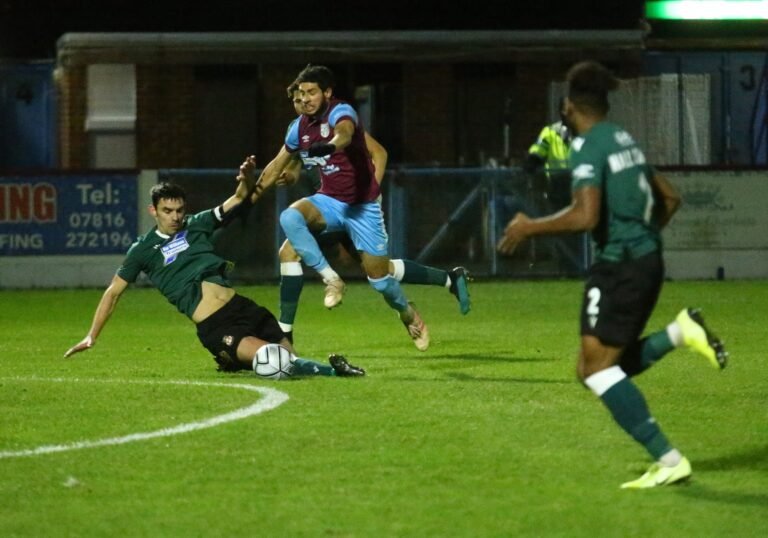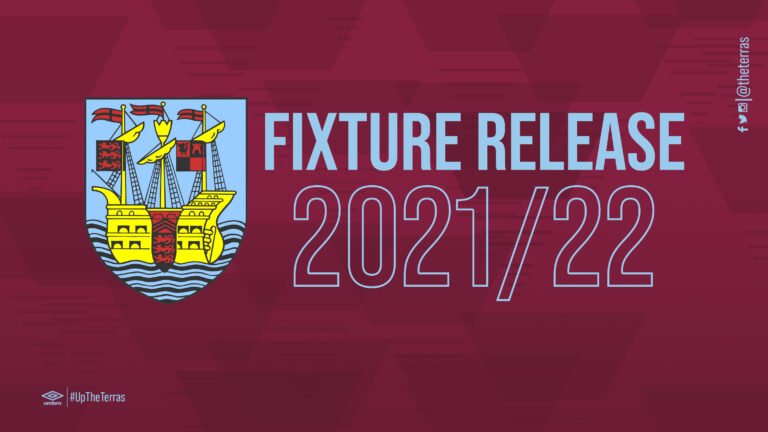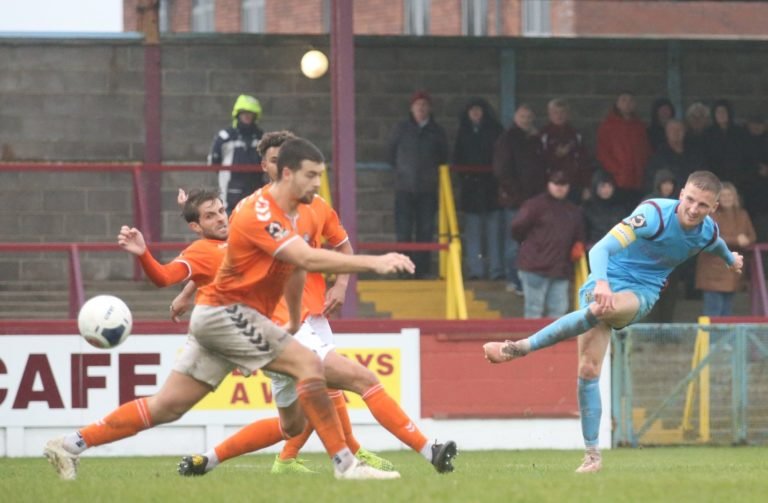Football History
Terras fans have chosen to interview a man who has been associated with Weymouth Football Club for more than half a century.
On the pitch he was an integral part of Weymouth’s most successful ever side and took part in the Terras’ biggest ever match.
He later returned to the club as physiotherapist and over 30 years he attended some 1750 games in this capacity.
He is now in his third year as club president. Bob Lucas is, quite simply, a Weymouth Football Club legend.
On January 6 he will be celebrating his 80th birthday and everybody associated with the club would like to congratulate Bob and wish him Many Happy Returns. Thanks Bob!
Bob Lucas was born in London’s East End on January 6 1925.
From an early age he knew that he wanted to be a footballer and there was never any doubt about what position he would play.
“There’s a saying in football that all goalkeepers are mad and another that goalkeepers are born and not made,” he said.
“It was just one of those things.”
The Lucas family home was damaged during the war and so they were evacuated to Maidenhead.
Before long Bob was representing Maidenhead’s under 18 team.
One day, aged 16, Bob turned up to watch the senior team and when the regular keeper was unable to get leave from the army, he was on hand to make his first team debut.
He kept his place for the rest of the season and when the family returned to London in 1942 he signed for Golders Green (Hendon), the former club of the Compton brothers.
Aged 17 Bob was given a trial by Crystal Palace and immediately offered a professional contract but as soon as he turned 18 he was called up into the Navy and could only fit in football on home leave.
In July 1946 he was demobbed and went straight back into full-time football with Palace and made his first team debut in a 2-1 victory over Bristol Rovers.
He went on to make four first team and 76 reserve team appearances during two seasons.
When five of his team-mates joined the newly-formed Tonbridge FC, Bob decided to go part-time and join them, becoming their first ever goalkeeper.
During the day he turned his attention to learning the skills of the printer and the following season he was invited down to the south coast to join Weymouth Football Club.
Keen to leave the notorious London smogs, Bob jumped at the chance and moved down to the seaside.
He said: “I was 24 when I came down to Weymouth in July 1949. In the August I wanted a new pair of football boots so I went to the sports shop and there was this beautiful 17-year-old girl serving there.
It was Jean. I can’t remember if I bought any boots but I got her!”
Bob represented Weymouth for two years and was part of the side who famously played at Manchester United in the FA Cup.
But it was proving increasingly difficult for Bob to find work, and with no positions available in the printing industry, he felt he had to return to London.
But while playing for Ramsgate, Bob suffered a ruptured lung which ended his playing career.
“I was very ill and I made the decision that, despite the lack of jobs, I wanted to move back to Weymouth and the lovely fresh air,” he said.
There were some very tough times ahead.
Bob got a job driving double-decker buses but the hours were painfully long and kept him away from his beloved family.
It was also during this time that he lost his five-year-old son Bobby to cancer.
After ten years on the buses Bob got a job at the Friary Press in Dorchester and he was also offered the job of physio with Dorchester Town FC.
He earned his qualifications along the way and after six years the FA invited him to be their physiotherapist at their coaching courses, a role he undertook for 15 years.
In 1972 Graham Williams persuaded him to return to Weymouth as physio and 30 years later in 2002 he decided to retire.
He is now happy to watch the game from the directors’ box in his new role as club president.
Even after 63 years of the game, Bob and Jean are still “football crazy”.
1. Having been a player, physio and president, which position did you prefer?
I’ve enjoyed them all. Your playing days are the best and I had some great times but I also thoroughly enjoyed my 30 years looking after the players.
Now I can sit back and relax a bit more in my role as president.
2. Do you still do anything to keep fit?
Just walking really. I think fitness comes from the mental as well as the physical.
3. Who are the best players you have played with?
There was a player at Weymouth called Tom Brawley and he was as fine a centre half as I have ever played behind.
He was only about 5’9″ but he had such power in his legs and he timed his jumping so perfectly that he would sope in the air with any giant centre-forward.
He was very strong in the tackle and his ball distribution was fantastic.
Then there was Sammy McGowan whose wing play was a joy to watch.
But to be honest I prefer to look at a team as a group and not to single out any one individual as being any better than another.
4. Why did you become a physio?
I had a natural inclination to that type of thing. Seeing so much pain and suffering when we lost Bobby left me with a desire to help people. At the time the treatment players were given was negligible.
5. What is your all-time best Weymouth team?
The 1949-50 team was amazing. In my first year here we went 22 matches without defeat and that record still stands today.
There have been better individual players before and since then in all positions but as a team we were something special. We all just got on so well on and off the field.
6. Who was your most inspirational manager?
Brian Godfrey was a superb manager and coach.
7. What has been the best single game for Weymouth FC that you can remember?
Everybody talks about the Manchester United game but in the first round of the cup we played Aldershot, then a very good third division team.
We drew 2-2 at home and went up to their big pitch for the replay.
We had two players badly injured in the first 20 minutes and were losing 2-0.
There were no substitutes permitted in those days so we effectively had nine fit men and two virtual cripples, one hobbling about in great pain with a torn cartilage and another with a heavily bruised thigh.
But we all rolled our sleeves up and by half time we had equalised. In the second half we fought like tigers and six minutes from the end we scored a winning goal to beat them 3-2.
8. Did the Terras fans sing “Do you come from Manchester?” to the Man United fans back in the 1950 Cup tie?
No. There was friendly banter between adjacent rival fans but in those days we didn’t have the concerted chanting that we have today.
I would like to say the Manchester United fans gave the Terras a terrific reception and I, as the visiting goalkeeper, found the Stretford Road-enders superb.
9. Do you ever get fed up of people asking about that game?
No and I don’t think I ever will. I’ve got a lot of memories but I’ll never get fed up of talking about that one.
10. Were you ever tempted to go to another club?
As a physio I was offered jobs at Bournemouth and Torquay United but I turned them down. Nothing was quite enough to tempt me away from Weymouth.
11. What’s the biggest difference on the pitch now compared to when you played?
The quality of the playing surface is one of the biggest differences.
We used to play when it was frozen solid or an absolute mud bath.
Also, all the kit is quite light-weight now – in my playing years I saw many players knocked out cold by the ball.
The weight of it, particularly when it was wet, was tremendous.
12. What has been the worst injury you have had to treat?
In my 30 years as physio there were, obviously, many fractures, dislocations, muscle and ligament injuries etc.
It is very difficult, almost impossible, to say which was the worst.
As bad as any, however, was at Newport County in 1988 when an opponent’s stud ripped open Willie Gibson’s lower leg.
When I got on to him it was like an abattoir with muscle, bone and tendons exposed.
I remained at the Newport Hospital with Willie for five hours and after the insertion of 18 stitches brought him home to Weymouth by taxi.





